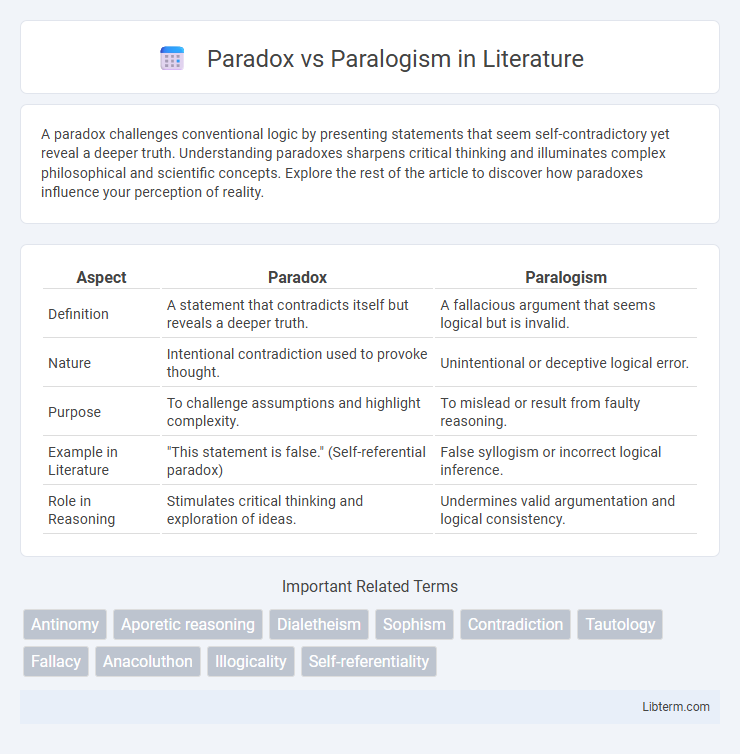A paradox challenges conventional logic by presenting statements that seem self-contradictory yet reveal a deeper truth. Understanding paradoxes sharpens critical thinking and illuminates complex philosophical and scientific concepts. Explore the rest of the article to discover how paradoxes influence your perception of reality.
Table of Comparison
| Aspect | Paradox | Paralogism |
|---|---|---|
| Definition | A statement that contradicts itself but reveals a deeper truth. | A fallacious argument that seems logical but is invalid. |
| Nature | Intentional contradiction used to provoke thought. | Unintentional or deceptive logical error. |
| Purpose | To challenge assumptions and highlight complexity. | To mislead or result from faulty reasoning. |
| Example in Literature | "This statement is false." (Self-referential paradox) | False syllogism or incorrect logical inference. |
| Role in Reasoning | Stimulates critical thinking and exploration of ideas. | Undermines valid argumentation and logical consistency. |
Understanding Paradox: Definition and Origins
A paradox is a statement or situation that defies intuitive logic by presenting conflicting yet potentially true elements, challenging conventional reasoning. Originating from the Greek word "paradoxos," meaning contrary to expectation, paradoxes often arise in philosophy, mathematics, and literature to provoke critical thinking. Unlike a paralogism, which is a logical fallacy or error in reasoning, a paradox invites deeper analysis to uncover hidden truths or resolve apparent contradictions.
Defining Paralogism: Key Concepts
Paralogism refers to a form of flawed or invalid reasoning that appears logical but contains hidden errors, often leading to false conclusions. Unlike paradoxes, which present seemingly contradictory yet true statements, paralogisms arise from structural defects in argumentation or misapplication of logical principles. Understanding key concepts such as deductive fallacies, logical inconsistencies, and faulty inference is crucial for identifying and correcting paralogistic reasoning in philosophical and critical thinking contexts.
Paradox vs Paralogism: Core Differences
Paradox and paralogism differ fundamentally in nature and purpose; a paradox is a seemingly self-contradictory statement that challenges intuition yet may reveal deeper truth, while a paralogism is a flawed or invalid argument resulting from incorrect reasoning. Paradoxes often stimulate critical thinking and philosophical inquiry by highlighting inconsistencies or unexpected outcomes, whereas paralogisms demonstrate logical errors that undermine argument validity. Understanding these distinctions is crucial in disciplines such as logic, philosophy, and rhetoric for evaluating argument integrity and conceptual clarity.
Historical Perspectives on Paradox
Historical perspectives on paradox trace back to ancient Greek philosophy, where figures like Zeno of Elea crafted paradoxes to challenge notions of motion and plurality, illustrating foundational conflicts in logic and metaphysics. Throughout history, paradoxes have served as critical tools for exposing contradictions within established thought systems, prompting deeper inquiry into language, truth, and reasoning frameworks. Unlike paralogisms, which are fallacious arguments, paradoxes stimulate intellectual advancement by highlighting the limitations and complexities of human understanding across various philosophical epochs.
Logical Structure of Paralogism
Paralogism involves a logical structure characterized by flawed or invalid reasoning where conclusions fail to follow from premises, often due to hidden assumptions or errors in inference. Unlike paradoxes, which present seemingly self-contradictory but logically coherent statements, paralogisms expose faulty deductive processes that undermine argument validity. Analyzing paralogisms requires identifying non sequitur patterns and semantic inconsistencies that break the chain of logical entailment.
Common Examples of Paradoxes
Paradoxes are statements or situations that defy intuition by appearing self-contradictory or logically absurd yet often reveal a deeper truth, with classic examples including the "Liar Paradox," where a sentence declares itself false, and the "Ship of Theseus," which questions identity in the face of change. Paralogisms, in contrast, are errors in reasoning that produce invalid arguments, often due to logical fallacies rather than meaningful contradictions. Understanding paradoxes through examples like the "Grandfather Paradox" in time travel or Zeno's paradoxes enhances critical thinking by challenging assumptions about truth and reality.
Famous Instances of Paralogism
Famous instances of paralogism include Immanuel Kant's "Critique of Pure Reason," where he demonstrates errors in traditional metaphysics through flawed syllogistic reasoning. Another notable example is the use of paralogisms in Freudian psychoanalysis, revealing unconscious biases underpinning supposed logical deductions. These cases highlight how paralogisms challenge faulty reasoning structures, contrasting with paradoxes that showcase self-contradictory or counterintuitive truths.
Impact of Paradoxes in Philosophy and Logic
Paradoxes challenge established logical frameworks by revealing contradictions that provoke deeper inquiry into foundational concepts of truth and reasoning, significantly impacting both philosophy and formal logic. They often expose limitations or inconsistencies within existing theories, prompting the development of new approaches such as non-classical logics and advanced semantic theories. Unlike paralogisms, which are simply flawed arguments due to errors in reasoning, paradoxes serve as valuable tools for philosophical reflection and the refinement of logical principles.
Consequences of Paralogisms in Argumentation
Paralogisms undermine the validity of an argument by introducing logical errors that lead to false or misleading conclusions, compromising the overall credibility of the reasoning process. Unlike paradoxes, which present seemingly contradictory yet insightful dilemmas, paralogisms result in faulty inference and can derail rational discourse. Recognizing and avoiding paralogisms is crucial to maintaining sound argumentation and preventing the spread of misinformation.
Paradox and Paralogism: Real-World Applications
Paradoxes stimulate critical thinking in fields like philosophy and physics by challenging established logic, such as Schrodinger's cat illustrating quantum superposition. Paralogisms, often found in flawed legal reasoning or misconceptions in everyday arguments, highlight errors in logical inference that can impact decision-making processes. Understanding both paradoxes and paralogisms enhances analytical skills crucial for problem-solving and improving discourse accuracy in real-world situations.
Paradox Infographic

 libterm.com
libterm.com